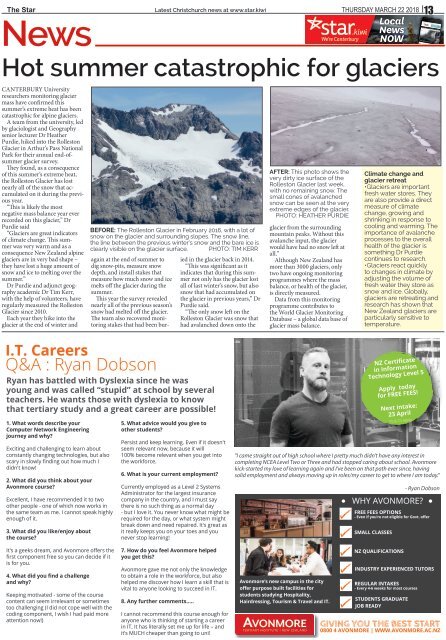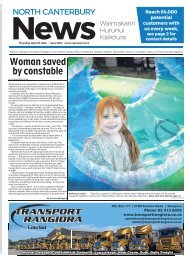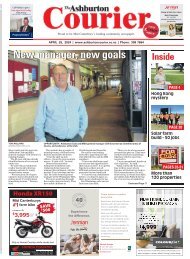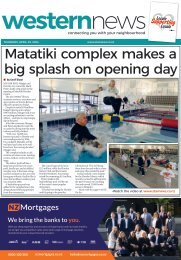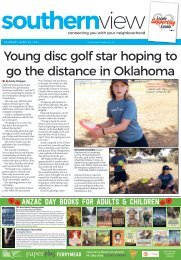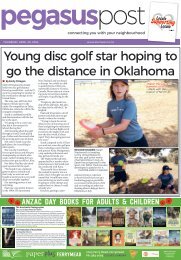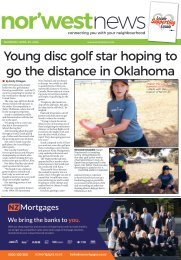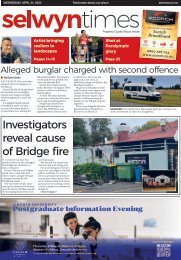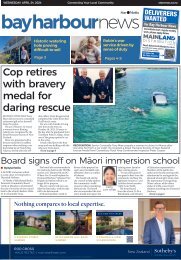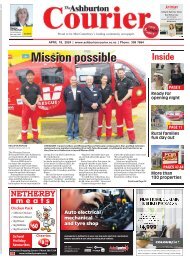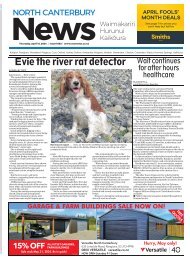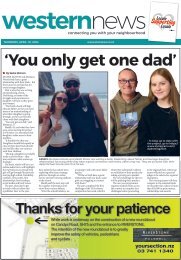The Star: March 22, 2018
Create successful ePaper yourself
Turn your PDF publications into a flip-book with our unique Google optimized e-Paper software.
<strong>The</strong> <strong>Star</strong> 13<br />
News<br />
Local<br />
News<br />
Now<br />
Latest Christchurch news at www.star.kiwi<br />
Thursday <strong>March</strong> <strong>22</strong> <strong>2018</strong><br />
Hot summer catastrophic for glaciers<br />
Fire rages, homes at risk<br />
CANTERBURY University<br />
researchers monitoring glacier<br />
mass have confirmed this<br />
summer’s extreme heat has been<br />
catastrophic for alpine glaciers.<br />
A team from the university, led<br />
by glaciologist and Geography<br />
senior lecturer Dr Heather<br />
Purdie, hiked into the Rolleston<br />
Glacier in Arthur’s Pass National<br />
Park for their annual end-ofsummer<br />
glacier survey.<br />
<strong>The</strong>y found, as a consequence<br />
of this summer’s extreme heat,<br />
the Rolleston Glacier has lost<br />
nearly all of the snow that accumulated<br />
on it during the previous<br />
year.<br />
“This is likely the most<br />
negative mass balance year ever<br />
recorded on this glacier,” Dr<br />
Purdie said<br />
“Glaciers are great indicators<br />
of climate change. This summer<br />
was very warm and as a<br />
consequence New Zealand alpine<br />
glaciers are in very bad shape –<br />
they have lost a huge amount of<br />
snow and ice to melting over the<br />
summer.”<br />
Dr Purdie and adjunct geography<br />
academic Dr Tim Kerr,<br />
with the help of volunteers, have<br />
regularly measured the Rolleston<br />
Glacier since 2010.<br />
Each year they hike into the<br />
glacier at the end of winter and<br />
BEFORE: <strong>The</strong> Rolleston Glacier in February 2016, with a lot of<br />
snow on the glacier and surrounding slopes. <strong>The</strong> snow line,<br />
the line between the previous winter’s snow and the bare ice is<br />
clearly visible on the glacier surface. PHOTO: TIM KERR<br />
again at the end of summer to<br />
dig snow-pits, measure snow<br />
depth, and install stakes that<br />
measure how much snow and ice<br />
melts off the glacier during the<br />
summer.<br />
This year the survey revealed<br />
nearly all of the previous season’s<br />
snow had melted off the glacier.<br />
<strong>The</strong> team also recovered monitoring<br />
stakes that had been buried<br />
in the glacier back in 2014.<br />
“This was significant as it<br />
indicates that during this summer<br />
not only has the glacier lost<br />
all of last winter’s snow, but also<br />
snow that had accumulated on<br />
the glacier in previous years,” Dr<br />
Purdie said.<br />
“<strong>The</strong> only snow left on the<br />
Rolleston Glacier was snow that<br />
had avalanched down onto the<br />
AFTER: This photo shows the<br />
very dirty ice surface of the<br />
Rolleston Glacier last week,<br />
with no remaining snow. <strong>The</strong><br />
small cones of avalanched<br />
snow can be seen at the very<br />
extreme edges of the glacier.<br />
PHOTO: HEATHER PURDIE<br />
glacier from the surrounding<br />
mountain peaks. Without this<br />
avalanche input, the glacier<br />
would have had no snow left at<br />
all.”<br />
Although New Zealand has<br />
more than 3000 glaciers, only<br />
two have ongoing monitoring<br />
programmes where the mass<br />
balance, or health of the glacier,<br />
is directly measured.<br />
Data from this monitoring<br />
programme contributes to<br />
the World Glacier Monitoring<br />
Database – a global data base of<br />
glacier mass balance.<br />
Climate change and<br />
glacier retreat<br />
•Glaciers are important<br />
fresh water stores. <strong>The</strong>y<br />
are also provide a direct<br />
measure of climate<br />
change, growing and<br />
shrinking in response to<br />
cooling and warming. <strong>The</strong><br />
importance of avalanche<br />
processes to the overall<br />
health of the glacier is<br />
something Dr Purdie<br />
continues to research.<br />
•Glaciers react quickly<br />
to changes in climate by<br />
adjusting the volume of<br />
fresh water they store as<br />
snow and ice. Globally,<br />
glaciers are retreating and<br />
research has shown that<br />
New Zealand glaciers are<br />
particularly sensitive to<br />
temperature.<br />
I.T. Careers<br />
Q&A : Ryan Dobson<br />
Ryan has battled with Dyslexia since he was<br />
young and was called “stupid” at school by several<br />
teachers. He wants those with dyslexia to know<br />
that tertiary study and a great career are possible!<br />
1. What words describe your<br />
Computer Network Engineering<br />
journey and why?<br />
Exciting and challenging to learn about<br />
constantly changing technologies, but also<br />
scary in slowly finding out how much I<br />
didn't know!<br />
2. What did you think about your<br />
Avonmore course?<br />
Excellent, I have recommended it to two<br />
other people - one of which now works in<br />
the same team as me. I cannot speak highly<br />
enough of it.<br />
3. What did you like/enjoy about<br />
the course?<br />
5. What advice would you give to<br />
other students?<br />
Persist and keep learning. Even if it doesn't<br />
seem relevant now, because it will<br />
100% become relevant when you get into<br />
the workforce.<br />
6. What is your current employment?<br />
Currently employed as a Level 2 Systems<br />
Administrator for the largest insurance<br />
company in the country, and I must say<br />
there is no such thing as a normal day<br />
- but I love it. You never know what might be<br />
required for the day, or what system might<br />
break down and need repaired. It's great as<br />
it really keeps you on your toes and you<br />
never stop learning!<br />
NZ Certificate<br />
in Information<br />
Technology Level 5<br />
FREE FEES OPTIONS<br />
- Even if you’re not eligible for Govt. offer<br />
SMALL CLASSES<br />
Apply today<br />
for FREE FEES!<br />
Next intake:<br />
23 April<br />
T’s & C’s Apply<br />
"I came straight out of high school where I pretty much didn’t have any interest in<br />
completing NCEA Level Two or Three and had stopped caring about school. Avonmore<br />
kick-started my love of learning again and I’ve been on that path ever since, having<br />
solid employment and always moving up in roles/my career to get to where I am today."<br />
- Ryan Dobson<br />
WHY AVONMORE?<br />
It's a geeks dream, and Avonmore offers the<br />
first component free so you can decide if it<br />
is for you.<br />
4. What did you find a challenge<br />
and why?<br />
Keeping motivated - some of the course<br />
content can seem irrelevant or sometimes<br />
too challenging (I did not cope well with the<br />
coding component, I wish I had paid more<br />
attention now!)<br />
7. How do you feel Avonmore helped<br />
you get this?<br />
Avonmore gave me not only the knowledge<br />
to obtain a role in the workforce, but also<br />
helped me discover how I learn a skill that is<br />
vital to anyone looking to succeed in IT.<br />
8. Any further comments…..<br />
I cannot recommend this course enough for<br />
anyone who is thinking of starting a career<br />
in IT. It has literally set me up for life – and<br />
it’s MUCH cheaper than going to uni!<br />
Avonmore’s new campus in the city<br />
offer purpose built facilities for<br />
students studying Hospitality,<br />
Hairdressing, Tourism & Travel and IT.<br />
NZ QUALIFICATIONS<br />
INDUSTRY EXPERIENCED TUTORS<br />
REGULAR INTAKES<br />
- Every 4-6 weeks for most courses<br />
STUDENTS GRADUATE<br />
JOB READY<br />
GIVING YOU THE BEST START<br />
0800 4 AVONMORE | WWW.AVONMORE.AC.NZ


